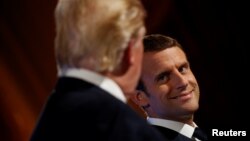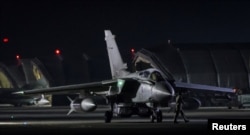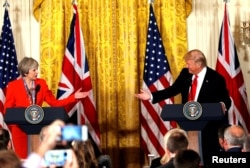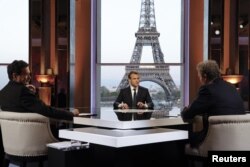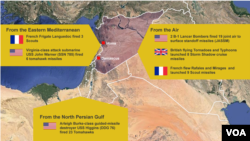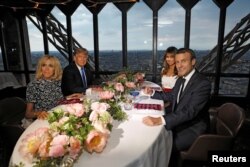In Europe, French President Emmanuel Macron led the charge for the Western military strike on Syria, but as far as the British are concerned, he did so by shoving them out the way.
Following Saturday’s U.S.-led coordinated airstrikes on Syria, British officials have taken to criticizing the young French leader, grumbling to the British media, in anonymous briefings, that the young Macron is too pushy and trying to upstage Britain’s Prime Minister Theresa May in a bid to present himself to U.S. President Donald Trump as America’s most important European partner.
And even more shocking, as far as the British are concerned, the French aren’t even disguising their ambition to replace Britain’s so-called “special relationship” with the U.S. with an even stronger one of their own.
British military officials complained to the Sunday Times that Macron is trying flex his muscles, accusing him of making sure France’s contribution to the strikes on Syria exceeded Britain’s with the French firing off 12 missiles compared to Britain’s eight.
One official told the newspaper, “France is very much trying to be America’s go-to guy in Europe and therefore jump ahead very, very quickly." A Downing Street official told The Times, “There’s an element of feeling that Macron is looking to make a bit of a name for himself and to show his credentials to Trump. For us, it was not a numbers game.”
Meanwhile, French officials acknowledge Macron is eager to position himself as Trump’s more important partner in Europe. They brag that Trump talked twice with the French leader in the early stages of the planning for the Syria retaliation before even speaking with May.
The competitiveness between Paris and London just days before Macron is due to arrive in Washington for a visit, which the French stress will include a state dinner at the White House, may strike some as an exercise in pettiness.
Nonetheless, officials on both sides of the English Channel are in earnest in their efforts to market their national leader as the one Washington should value the most, and heed.
Transatlantic ties have taken on greater importance for Britain as it struggles to shape a future after Brexit, Britain's departure from the European Union. A trade deal with the United States could help offset the costs of leaving the EU, Britain’s biggest trading partner, and May’s aides have made no secret of their belief that a stronger alliance with America will be critical in securing a quick deal and to making a success of Brexit.
French officials say forging a relationship with Trump similar to the one that Tony Blair, as prime minister, nurtured with President George W. Bush, which is the goal, will give Macron the opportunity to mediate between the U.S. and Europe and strengthen France’s hand internationally.
With German Chancellor Angela Merkel weakened and absorbed in domestic politics and Theresa May ensnared in Brexit negotiations, Macron has the chance to be the main European influence on Trump, something Macron said Sunday he had already been able to do.
In a television interview, Macron said he was the one who had convinced Trump to limit the American-led strikes on Syria to President Bashar al-Assad’s chemical weapons facilities and not to target airfields or intelligence buildings. Limiting the airstrikes wasn’t Trump’s initial plan, according to the French leader. “We also persuaded him that we needed to limit the strikes to chemical weapons [sites], after things got a little carried away over tweets,” he said, a reference to a series of Trump postings last week on Twitter.
While it is unusual for a French leader to market himself as shaping U.S. military policy in the Middle East, Macron and Trump have developed a friendly relationship during the past year and Macron doesn’t share the prickly anti-Americanism of some of his predecessors in the Élysée Palace, say analysts. The two leaders have talked several times with Macron seizing the chance to become, the French say, Trump’s “Tony Blair.”
It didn’t look like the two would get along. Last May, when they met for the first time, they engaged in a tight-gripped hand-wrestling bout with neither leader seemingly wanting to be the first to let go in what was dubbed the “never-ending handshake.”
In July, however, France put on a dazzling Bastille Day display for President Trump during the U.S. leader’s trip to Paris. “It was a great honor to represent the United States at the magnificent #BastilleDay parade. Congratulations President @EmmanuelMacron!”, Trump tweeted afterward.
A Trump statement, released by the White House after the trip, said, “Melania and I were proud to stand with the President of France and Madame Macron and to celebrate with the French people” the 228th anniversary of the French Revolution. “France is America’s first and oldest ally,” Trump said, adding, “America and France will never be defeated or divided.”




